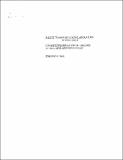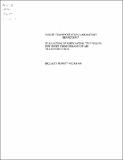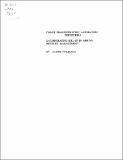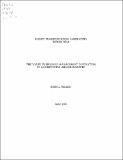Browsing Department of Aeronautics and Astronautics by Subject "Revenue management"
Now showing items 1-7 of 7
-
Competitive behavior of airlines at multiple airport systems
([Cambridge, Mass.] : Flight Transportation Laboratory, [1995], 1995)The way passenger traffic is distributed at multiple airport systems continues to intrigue air transportation planners, urban planners, and policy-makers as researchers attempt to unravel how airlines, air travelers and ... -
Evaluation of forecasting techniques for short-term demand of air transportation
([Cambridge, Mass. : Massachusetts Institute of Technology, Dept. of Aeronautics & Astronautics], Flight Transportation Laboratory, [1995], 1995)Forecasting is arguably the most critical component of airline management. Essentially, airlines forecast demand to plan the supply of services to respond to that demand. Forecasts of short-term demand facilitate tactical ... -
Forecasting for airline network revenue management : revenue and competitive impacts
(Cambridge, Mass. : Massachusetts Institute of Technology, Dept. of Aeronautics and Astronautics, Flight Transportation Laboratory, [1998], 1998)Airline revenue management entails protecting enough seats for late-booking, high-fare passengers while still selling seats which would have otherwise gone empty at discounted fares to earlier-booking customers. In the ... -
Incorporating sell-up in airline revenue management
([Cambridge, Mass. : Massachusetts Institute of Technology], Flight Transportation Laboratory, [1998], 1998)The decision to buy a fare that is higher than the desired fare, under the situation when the desired fare is not available, is known as sell-up. Passengers' willingness to sellup can have considerable impact on airline ... -
Investigation of competitive impacts of origin-destination control using PODS
([Cambridge, Mass. : Massachusetts Institute of Technology], Flight Transportation Laboratory, [1998], 1998)The Passenger Origin / Destination Simulator (PODS) was used to investigate the competitive impacts of Origin-Destination control airline Revenue Management (RM) methods. Experiments performed included revenue performance ... -
Network value concept in airline revenue management
([Cambridge, Mass. : Massachusetts Institute of Technology], Flight Transportation Laboratory, [1998], 1998)A connecting passenger occupies a seat on each of the flight leg of his itinerary. Moreover, for a given fare class, the fare of a connecting passenger is lower than the sum of the fares of the local passengers on the ... -
The value of revenue management innovation in a competitive airline industry
(Cambridge, MA : [Massachusetts Institute of Technology], Flight Transportation Laboratory, [1995], 1995)The value of revenue management to the airlines has been amply demonstrated, both by industry experience and in simulation studies of the reservation process. However, there have been no attempts to determine if the benefits ...






